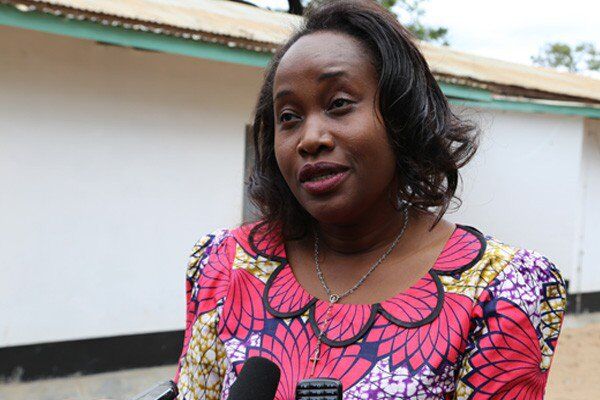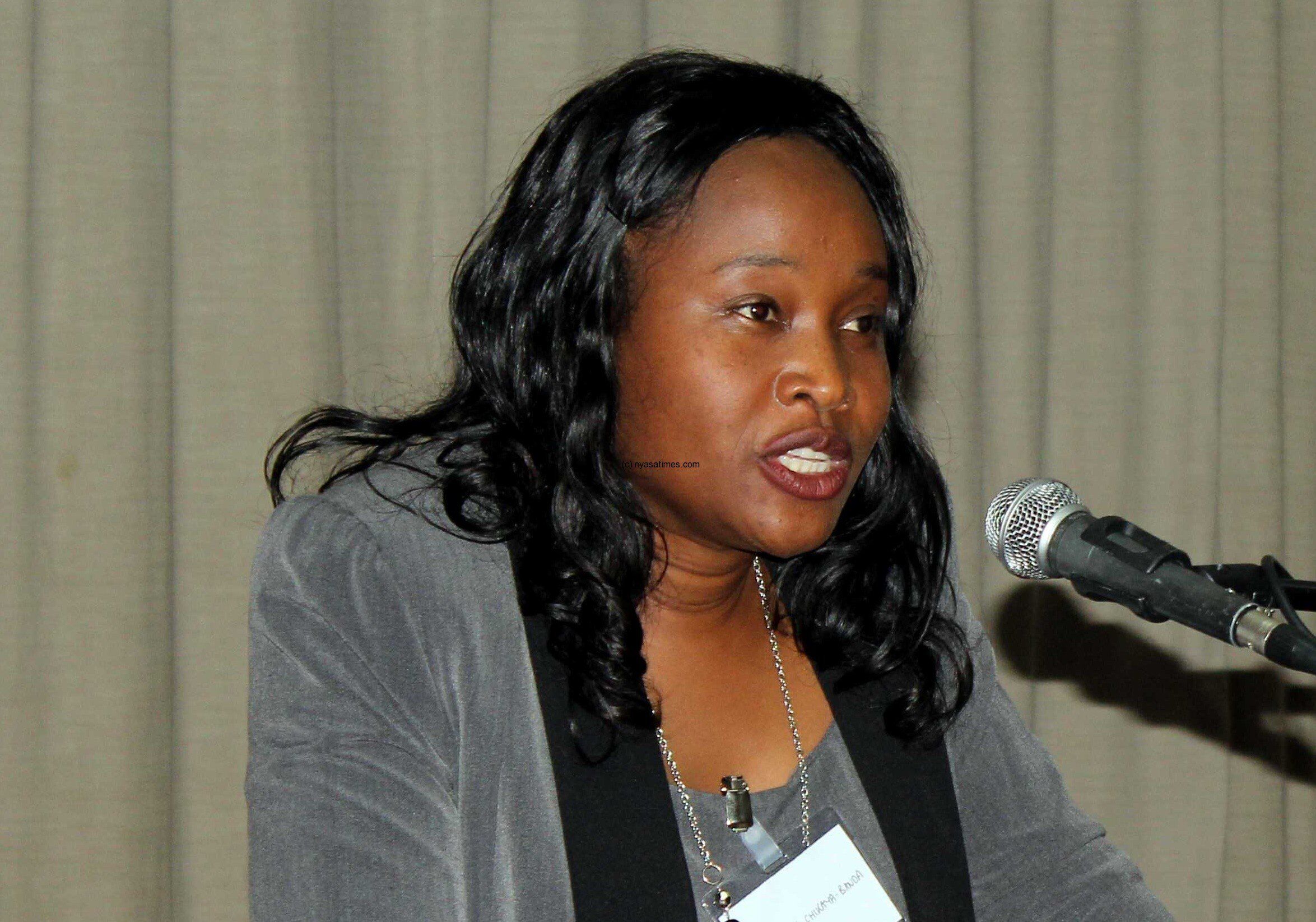
Janet Banda who is a member of the commission of inquiry investigating minister of agriculture George Chaponda has had her impartiality questioned after she attacked the courts for suspending the minister.

Soon after the Mzuzu High Court granted the injunction to suspend Chaponda, Banda who is also Solicitor General wrote on her Facebook account expressing anger over the ruling.
“A democracy of anarchy where some of the three branches of government don’t know exactly what their powers and functions are.
“Important to know where executive functions start and end! Where the judicial functions start and end! And where the legislative functions start and end! Democratic anarchy is rather frustrating to constitutional and administrative lawyers such as some of us,” she wrote.
But critics have questioned her neutrality saying it will be hard for Malawians to trust the outcome of the commission of inquiry.
“A person who was supposed to act with impartiality, neutrality and independence Janet Banda is nothing but an interested party and Malawians should not expect anything good from the commission,” said government critic Gerald Kampanikiza.
Commenting on the same, Dannie Phiri called for Banda’s resignation from the commission of inquiry saying she has shown that she is not unbiased.
“Isn’t the Solicitor General supposed to voluntarily fall on her sword considering that she can’t be a neutral member of the commission probing the scandal?,” asked Phiri in a Facebook post.
President Peter Mutharika set up the commission of inquiry to probe Admarc’s procurement of maize from Zambia. This followed accusations that Admarc bosses and Chaponda bought the maize through a Zambian company and not directly from the Zambian government in order to earn K10 billion from the deal.















In 2008, presidential and parliamentary elections were held. The Movement for Democratic Change was acknowledged to have won a majority of seats. Mugabe kept control because of a closed door recount without independent monitors. The MDC candidate, Tsvangirai, did not receive the required number of votes after the recount.
In 2008, an agreement to share power was reached between Tsvangirai and Mugabe. Mugabe would remain president and Tsvangirai would become prime minister. The agreement was not fully implemented until 2009. Tsvangirai left office in 2013 and that post has since been abolished. Joice Mujuru was appointed Vice-President in 2004.
Zimbabwe: Geography and Environment
Zimbabwe, a landlocked country, is mostly elevated in the central plateau at altitudes between 1,200m and 1,600m. The east is mountainous and Mt. Nyangani is the highest point in Zimbabwe at 2,592 meters. 20 percent of Zimbabwe is low veld under 900 meters. Victoria Falls is located in the country. There is a tropical climate with a rainy season from November to March.
Zimbabwe: Environmental Issues
Zimbabwe’s population growth, poverty, and lack of fuel have led to deforestation. This has led to erosion and degradation, reducing the amount of fertile soil. Toxic waste has also resulted from poor mining practices.
Zimbabwe: Administrative Divisions
Zimbabwe has 11 provinces whose names were derived from those at colonization. Each province is led by a provincial governor, appointed by the president. Each province is further subdivided into 59 districts and 1,200 wards. A district administrator heads each district. Rural district councils also exist in non-urban areas. Ward Development Committees govern the ward areas. Wards are further subdivided into villages.
Zimbabwe: Government and Politics
Zimbabwe is a semi-presidential republic. There is an upper chamber, the Senate, and the lower chamber, the House of Assembly.
The ZANU-PF has been the dominant party since independence. In 1987, Prime Minister Mugabe changed the constitution to make himself president. International observers have criticized elections in the country, particularly those in 1990, as rigged and unfair.
After contested elections in 2008 that many felt were rigged, the opposition leader Tsvangirai and Mugabe agreed to a power sharing deal. Mugabe would remain president and Tsvangirai would become the prime minister. Tsvangirai left office in 2013 and that post has since been abolished.
Zimbabwe: Human Rights
Reports of human rights violations are widespread. International groups allege the government violates basic rights to shelter, food, freedom of movement, and freedom of assembly. The media and political organization have been attacked.
Police often attack opposition gatherings. In 2007 and 2008, there were several crackdowns against the MDC during the election campaign which led to 49 activists being beaten and arrested.
Zimbabwe: Armed Forces
The country’s military is known as the Zimbabwe Defense Forces (ZDF). It was formed from three forces the ZANLA and ZIPRA on one side and the RSF on the other. The country has an army and an air force as separate entities.
The forces were placed under a single command in 1995. General Vitalis Zvinavashe was the first commander. After he retired in 2003, General Constantine Chiwenga was appointed the new commander.
The army’s active strength is 30,000, with a further 20,000 reported to be in in reserve. The air force has 5,139 men. The Republic Police forces are also part of the defense force and number 25,000.
Zimbabwe: Economy
Crop production has fallen in recent years. Major foreign currency earners are minerals, agriculture, and tourism Mining is still lucrative and the country has one of the world’s largest platinum reserves. There are also large diamond fields. Corruption has largely dissipated these revenues.
There was economic growth through the 1980s and 1990s. the economy declined from 2000. The government has abandoned its efforts to create a market economy. Inflation is soaring and there
I just want to ask my fellow malawian to take this isue as a malawian story in politics, and u must write this if you are a writter, and some of you, you must keep this in your memory so that in 2019 during Presidential Election it will be easy for you to make a good choice guided by the history you wrote, just like now M.C.P can not win and will never win because their story was written, let history guide you before you make a decision!
Janet banda ndi chibwenzi cha joji chaponda
Remind Me: Which Constitution Did APM Swear To Uphold?
Those are Malawian solicitors. I’m sure she is a quarter educated solicitor
Show us an evidence from any commission of inquiry since the death of our beloved brother Chasowa, Matafale and those whom u know where are the out come? nothing it’s amatter of worsting time Chaponda must resign
Mr Owen zachikunja pa gulu ngati apa mulibe manyazi? Ngati mulibe zolemba bwanji osangokhala chete. We are here to build our nation osati za ku nyau pano ai
She’s not shown her side yet, she’s only expressing how best the judgement should be handled
Nanga choncho??
Amai mwatichititsa manyazi
fuck u,if ur hired 2vioret this national agenda.do yu wanna dssappear 4favouring this killer ‘chaponda’?demet.
Achaponda Adausi Apeter azivaya bass kamba koti yose okuba
Guzy dont be serious with politics is adirty game
the real bitch of devil, luk @her no vision in her fucking eyes ,bull shit just fuck this old pussy off government
If You NEED A good trader to manage your account or assist you in trading Binary ? I will recommend Mr Robert to help you because he really helped me a lot and he knows everything about trading, thanks to Mr Robert for all you have done for me .Feel free to contact Mr Robert directly via his mail {robertberger42@yahoo.com}
skype id: (robertb812)or you can add him up via his Fb link https://www.facebook.com/profile.php?id=100012920413850
Be strong sister!! Keep it up what is in your mind!!
amapanga sex ndi chaponda
Wat an idiot lady, she knws nothing about law.
Aunt dont part to fool people.
Stupid and ugly whore! politicians use stupid people like her but at the end they kill to destroy evidence. She had been hooked and will become a Condom for dirty uses!!
ee zizungutu apa kkk chaponda ationesa zithu apa kk
This commission out of order
Azimai game of gambling imawabvuta they don’t know when to throw or when to walk away, eish! Shame play your cards well mama it is a man’ s world so think like you are playing chase otherwise you will make us look stupid foolish woman
Indeed, very very Foolish woman!
Janet Kunyini konunkhako wamva?!!!
This woman ,must leave malawi & she is a disgruntled dog.
mayi uyu akufunika kumusowesa nayeso pamutumbo pakopo chitsilu iwe pamoz ndi bambo ako aja usowa naweso galu yodyesedwa iyi
I like your comment kkkkkk nice one
galu iyi yopanda manyaz pamutombo pa amake ndithu
There is no question that the judge’s decision to suspend a cabinet minister is unprecedented and smacks of an error of law. And because she sits on the commission established to inquire the actions of the same minister, Janet Banda has committed a grave error herself! She should have kept her big mouth tightly shut.
Commission of inquiries have never produced results in Malawi full ✋. What a waste of time ⌚
Mbava izi zimadyera limodzi akafunse cashgate namathanga ali kuti?
what exactly did she write?
nde tiziti chilungamo apa?
Mai opusa ameneyu akachita nkhope ngati mamuna
Its only one strong woman in africa….Thuli madonsela not these morons or gold diggers
She claims to have made her comments for academic debate, on Facebook?
Vimilomo vake ngati mbali
Mai mwawonesa kupanda zeru,ndipo mwazichosela ulemu mutukwanika
As Solistor General Already She Has Failed Her Duty She Suppose To Advise President On Legal Matters She Would Have Advised The President To Remove Chaponda Before Commission Is Set She Would Have Advised The President Not To Include Her In The Commission Based On The Fact The She Is Second Legal Advisor Tn The President After Attorny General I Doubt If This Commission Is Going To Produce Tangible Results
Am told she is a proffessional Whore!
kkkkkkkkm
No wonder cz she is too ugly!!!
may be Anastanzia Nsosa will do the right job.
Muzikura kungokharira kutukwana bwaj ndife amozi
Now I understand why Buhari, the Nigerian president said ” my wife belongs to the kitchen”. They can’t even make their own decision but used by these thugs & then dumped like a used unjeni. Shame.
Mpaka kutukwana
kodi ndi nzimayi mwayikayo si aunt Tiwo?
she has to be removed as she has arleady shown her side and people cant trust her…
msieni ndi mzake wa chakwela ameneyo
Who is she,to question the judicial decisions? Ngati wadya nawo uli mmadzi Janet .
Kunyasa nkhope ngati nyini ya galu.
magazi kumtumbo akasambe
Bwanji kodi ? Kkkkkk
I thought the suspension would have been good for them to do their job without hindrances, shame on her.
Shame
Can’t they b like Thuli Madonsela,,the woman of the moment loved by the whole nation and all races?
I love Thuli
eti eti koma we malawian women…aitee
What u call commission of inquiry is not a commission of inquiry at all. So you think Peter is stupid enough to set up a commission of inquiry that does not work in favour of corrupt DDP government?
? bro
AZIMAYI AZIPUMI ZDZAZIKULUWA AMAKHALA OCHEDWA KUNGANIZA…..MWINA BWENZI LAWO LINAKABO KKKKKKK
haaaahahaa koma yaaa mungauswe mwano.
Champweteka m’chimanga
Azimayi athu enawa ….this woman is a coward sure
kupepera mai ameneyu sinanga iye akukhuta or chimanga chibwere sadzagula even ankolo akewo achaponda amadziwa kuti olo chikhale choola odzagula ndi ena. Mulungu awakanthe onsewa
Easy target ,,,easy prey!!!!
nkhani ya ufa ndiyovuta
Ladies are stupid hence easy to be used up n easy to die as their name #chicks…watch out mama and remember ur friend used up n die(get killed by those who used hr to cover themselves in Cashgate scandal) all politicians dnt care abt any1’s life as long they must b safe…..
kkkkk kma
kkkkk kma
True…azafera za ziiii
iliziko mulimva kuwawa mai janet malawi wakalipa heavy.